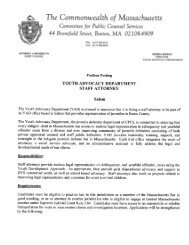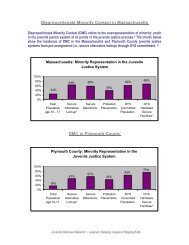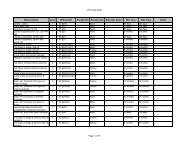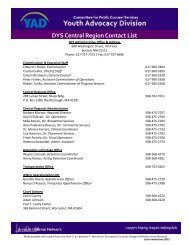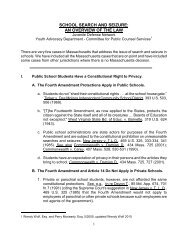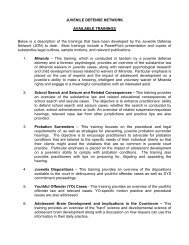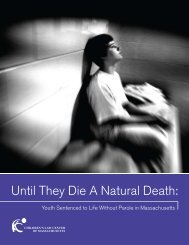States rethink 'adult time for adult crime' - the Youth Advocacy Division
States rethink 'adult time for adult crime' - the Youth Advocacy Division
States rethink 'adult time for adult crime' - the Youth Advocacy Division
Create successful ePaper yourself
Turn your PDF publications into a flip-book with our unique Google optimized e-Paper software.
Brain science offers insight to teen crime : Special Reports : Albuquerque Tribune<br />
planning and controlling impulses.<br />
In short, it keeps <strong>the</strong> amygdala in<br />
check. In teens, however, this area<br />
is barely functioning and will not be<br />
fully developed until age 20 to 25.<br />
6. Home prices increase despite saturation of houses on<br />
market<br />
7. PBS `Detectives' visits museum <strong>for</strong> typewriter clues<br />
8. Saudis would back Sunnis<br />
9. Unsers' lawyers call deputies "substandard"<br />
10. Four Democratic women vie <strong>for</strong> county clerk job<br />
decades in an<br />
<strong>adult</strong> prison.<br />
They questioned<br />
why a 16-yearold<br />
boy with no previous history of violence did nothing to stop his teen pals from stabbing his screaming<br />
grandparents in 1994 unless he was <strong>the</strong> cold and calculating killer prosecutors said he was.<br />
But if <strong>the</strong> trial took place now or years from now, would science have played a greater role in <strong>the</strong>ir deliberating<br />
Would Brown have been saved from <strong>the</strong> <strong>adult</strong> sanctions because of his teenage brain<br />
Advances in brain research suggest it's possible.<br />
Scientists are now seeing beyond <strong>the</strong> skull into an emerging debate over whe<strong>the</strong>r <strong>the</strong> differences between <strong>the</strong><br />
brain of an adolescent and an <strong>adult</strong> should have different implications <strong>for</strong> each in <strong>the</strong> criminal justice system.<br />
All of Today's News<br />
Events Calendar<br />
Restaurant Guide<br />
Podcasts<br />
Cell Phone and E-<br />
mail Alerts<br />
LoboZone.com<br />
Contest Zone<br />
Comics: Pearls<br />
Be<strong>for</strong>e Swine<br />
Comics: Get Fuzzy.<br />
Roundhouse Report<br />
Food City<br />
ABQ AV Club<br />
Be all you can bee<br />
Trib Sports Extra<br />
Wolf Tracks<br />
Split Personality<br />
No harm, no Fowler<br />
High School Sports<br />
The Flip Side<br />
Studies being conducted at institutions such as <strong>the</strong> Laboratory <strong>for</strong> Adolescent Science at Dartmouth College and<br />
<strong>the</strong> National Institute of Mental Health in Be<strong>the</strong>sda, Md., could someday lead to <strong>the</strong> development of tools to aid in<br />
determining juvenile offenders' degree of culpability as compared with <strong>adult</strong>s.<br />
That could mean future Michael Browns will have an additional argument <strong>for</strong> receiving juvenile sanctions, not<br />
<strong>adult</strong> sentences, in cases of kids who kill.<br />
"We are interested in <strong>the</strong> broader question of whe<strong>the</strong>r juveniles should be punished to <strong>the</strong> same extent as <strong>adult</strong>s<br />
who have committed comparable crimes," said psychologist Laurence Steinberg in his 2003 article, "Less Guilty<br />
by Reason of Adolescence."<br />
Take a "CSI" look into <strong>the</strong> teenage brain and you'll notice a firestorm of activity. But experts say it's where that<br />
http://www.abqtrib.com/news/2006/dec/08/brain-science-offers-insight-teen-crime/ (2 of 6)12/15/2006 2:32:28 PM




